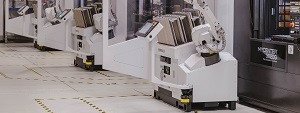
Reshoring becomes reality and that requires additional capacity
Reshoring becomes reality and that requires additional capacity
Increasing numbers of international companies seem to be moving their production back to Western Europe, the United Kingdom and the United States. Offshoring seems to be becoming a thing of the past, and reshoring the new reality. This should create additional jobs and boost the economy, but that also requires additional machine capacity. RoboJob can offer a solution.
Since the beginning of this century, more and more manufacturing companies have turned their sights eastwards. After all, in a global economy, costs had to be cut, and for more than 20 years, cheaper production options were considered in Eastern Europe and Asia. In recent years, this trend has been reversed, and more and more international companies are returning to Western Europe, the United Kingdom and the United States. The pandemic has only accelerated this movement.
A recent article in the European Business Review states that Industry 4.0 may well play an important role in bringing manufacturing back to the West: "Robots, 3D printing, the 'Internet of Things', and cloud computing are all factors that will gradually reduce the presence of labour in companies, especially when it comes to low or medium skills, which is the kind of work that used to be transferred abroad in the past." In other words, the implementation of Industry 4.0 principles is becoming essential to enable companies to reshore, otherwise, it simply becomes too expensive.
"We are indeed noticing that our industry is reviving at an ever-increasing pace. The order books are well filled, and there is a great demand for additional machine capacity," says Helmut De Roovere, CEO. "However, these machines are not always available, as demand is peaking at an enormous rate at short notice. And because of difficulties in the supply chain, it is often a year or more before that machine can be delivered. However, there are other ways to create additional capacity."
By this, De Roovere means CNC automation. "Additional capacity can also be created using existing machinery, simply by automating the existing machines," De Roovere explains. "The majority of the more than 1,000 CNC machines that we have automated to date are existing machines from a wide variety of manufacturers. We have gained so much experience by now that we can automate nearly any machine. Moreover, we have made good arrangements with our suppliers so that our Turn-Assist, Mill-Assist, Racks and Pallet-Load solutions can be delivered before the summer."
De Roovere is also convinced that CNC automation is becoming a necessity: "Let's be clear. There is indeed a future for the manufacturing industry in the West, but then we have to put all our efforts into automation, digitalisation and sustainable production with sustainable relationships between suppliers and their customers. This is the only way we can remain competitive with low-wage countries. Moreover, there is still a huge shortage of skilled technicians and operators, and this will not change in the short term. Automation is the only way we will be able to meet the demand for capacity in a smart way."